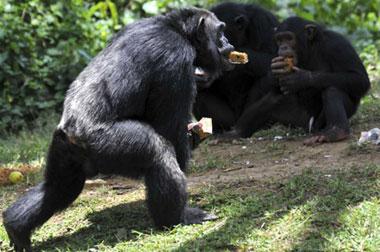Source: Xinhua
04-08-2009 09:21
Special Report: Tech MaxWASHINGTON, April 7 (Xinhua) -- Wild female chimpanzees copulate more frequently with males who share meat with them over long periods of time, according to the findings of a study led by researchers from the Max Planck Institute for Evolutionary Anthropology in Germany, which will be published on Wednesday in the U.S. open-access journal PLoS ONE.
 |
| The oldest alpha male chimpanzee in Uganda known as Zakayo eats a piece of cake on his 44th birthday at Uganda Wildlife Education Centre (UWEC) in Entebbe town, 42km (25 miles) south of capital Kampala, August 15, 2008. (Xinhua/Reuters, File Photo) |
How females choose their mating partners and why males hunt and share meat with them are questions that have long puzzled scientists. Evidence from studies on human hunter-gatherer societies suggest that men who are more successful hunters have more wives and a larger number of offspring.
Studies on wild chimpanzees, humans' closest living relative, have shown that male hunters frequently share meat with females who did not participate in the hunt. One of the hypotheses proposed to explain these findings is the meat-for-sex hypothesis, whereby males and females exchange meat for mating access. However, there has been little evidence in both humans and chimpanzees to support it.
In the recent research conducted in the Tai National Park, Coted'Ivoire, Cristina M. Gomes and Christophe Boesch found that females copulate more frequently with males who share meat with them on at least one occasion, compared with males who never sharemeat with them, indicating that sharing meat with females improves a male's mating success.
Although males were more likely to share meat with females who had sexual swellings (i.e., estrous females), excluding all sharing episodes with estrous females from the analysis did not alter the results. This indicates that short-term exchanges alone (i.e., within the estrous phase of the female) cannot account for the relationship between sharing meat and mating success.
